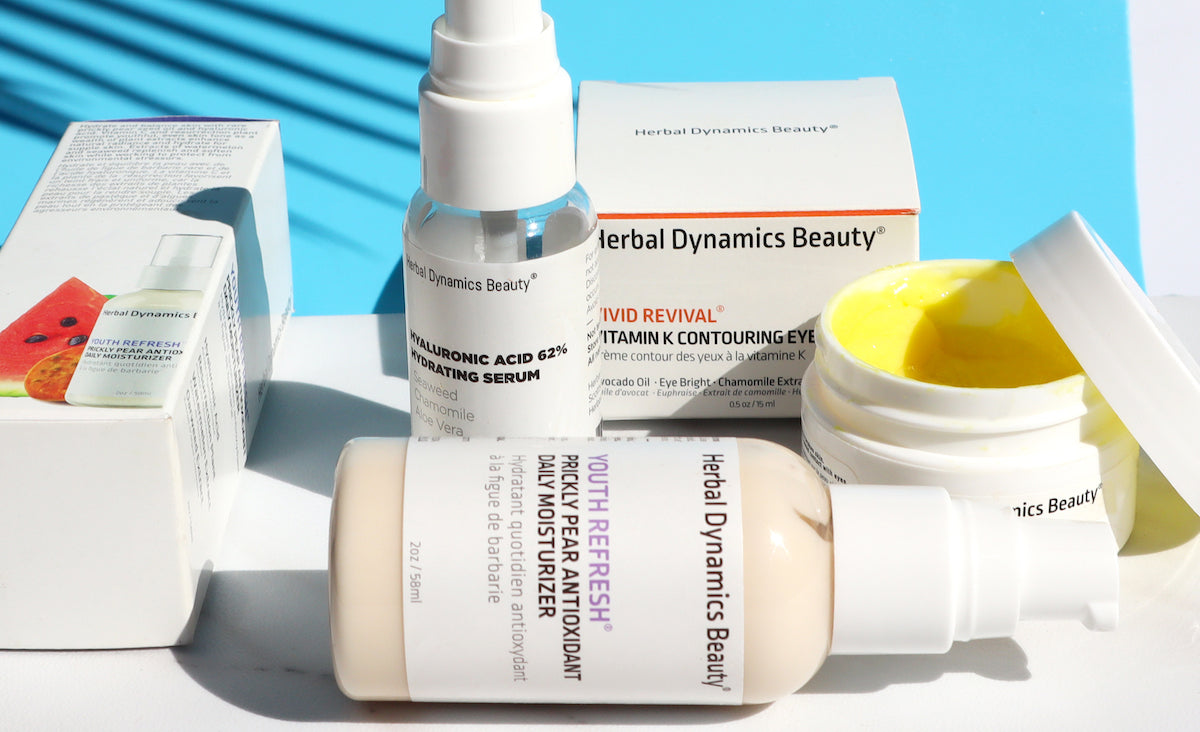Your Cart is Empty
FREE SHIPPING on US orders over $45. Save 25% With Code TAKE25 at checkout.
FREE SHIPPING on US orders over $45. Save 25% With Code TAKE25 at checkout.

Sun. Sweat. Sand. Salt. Memories of a summer stretched to its limits — afternoons at the pool, vacations at the beach, long hikes in the woods, naps in the park.
The only problem with all that time outdoors? Summer fun can have a major impact on your skin. Constant sun exposure can cause premature signs of aging and pose potential UV risks.
Time for (sun) damage control! Here’s our guide to helping your skin appear more youthful, refreshed and rejuvenated after a sun-soaked summer.
Exfoliating gets rid of dead skin cells and helps to unclog pores for an immediate, noticeable difference (the result is seriously satisfying!). Sweeping away the dry, dead skin uncovers fresh new cells below that increase the skin’s radiance, clarity, and youthfulness.
Those who struggle with uneven skin tone will appreciate the smoothing effects of regular exfoliating. Gentle exfoliation evens skin tone over time (and helps sun-stressed skin bounce back from too much time in the sun).
Facials are a great way to remove dry, dead skin cells and break up dark spots from sun damage. Check out our step-by-step guide to a spa-level facial at home for everything you need to know for a DIY facial!
Bonus: Exfoliation also preps your skin to better absorb any products you apply afterward.
Sun stress combined with harsh chlorinated water and dehydration can result in a tired, dull complexion (or even worse — skin that looks patchy and weatherworn).
Adding antioxidants to your skincare routine can help! Not only do they brighten and revitalize dull looking skin, they also protect skin cells from free radicals and help shield out UV rays.
The best antioxidants to look for in skincare products are vitamins A, C, E and green tea.
The foundation of overall skin health is hydration. Proper hydration actually increases the amount of water in your skin cells, resulting in a smooth, supple, healthy complexion.
Since the outer layers of the skin are composed mostly of dead skin cells, external hydration is the best way to quench skin and keep these cells hydrated.
Look for products that contain hyaluronic acid, which works by binding water molecules to the skin to replenish moisture. This enhanced hydration revitalizes the outer layers of the skin so they look and feel softer and smoother.
Hyaluronic acid also has antioxidant properties, which help protect skin from free radical damage and other environmental stressors. It’s the perfect hydrating ingredient to enhance your summer skin reboot!
Tip: Since chlorine pulls water out of the body, it’s especially important to hydrate and apply a rich moisturizer on pool days.
All the moisturizer in the world won’t make a difference if you’re not drinking enough water! Making a conscious effort to properly hydrate your body is a must. Your (fresh, healthy, hydrated) skin will thank you!
When it comes to food, research has shown that there’s a connection between good nutrition and skin health. That means that the right diet can help fight the signs of summer from the inside out.
So what are the best foods for bright, beautiful skin?
Avocados are packed with healthy fats, vitamins, and minerals that are great for the skin. Studies have also shown that avocados can help protect the skin against sun damage.
Nuts and seeds are packed with omega-3 fatty acids, which naturally help the body cope with spending too much time in the sun. Fish and eggs are also great sources of this healthy, skin-loving fat. Studies have shown that omega-3s are naturally anti-inflammatory and help reduce the damaging effects of sunburn.
Our bodies convert beta carotene into vitamin A, which is crucial for setting sun-damaged skin cells on a healthier course. Look to foods like carrots, sweet potatoes, and cantaloupe for a natural boost of this nourishing ingredient. Beta carotene also helps maintain the skin’s pH balance, which is essential for naturally glowing skin.
Leafy greens (like spinach, kale, broccoli, bok choy, and romaine lettuce) are rich in phytonutrients, which are powerful antioxidants that have been found to protect against wrinkling, sun damage, and even skin cancer.
When it comes to reversing sun damage, Vitamin C packs the ultimate punch. It protects, soothes, and helps boost collagen production for your healthiest glow ever. Citrus fruits (like oranges and grapefruits), tomatoes, blueberries, and watermelon are all great foods to add a boost of vitamin C to your diet.
Tip: Vitamin C can be applied topically as well. In fact, vitamin C face serums have significant healing properties that work to combat sun damage from every angle. Regular use of a vitamin C face serum has been shown to slow melanin production (fading brown spots and sun damage), diminish fine lines and wrinkles, and protect healthy skin cells against sun damage.
Your post-summer skin detox is not just important for repairing the damage of summer — it’s also an essential part of prepping your skin for the winter months ahead. A harsh winter season can actually be just as damaging to skin as the summer sun.
Fall is the perfect time to really focus on your skin so it’s hydrated, healthy and ready for the scarier weather that’s coming for it in a matter of months!